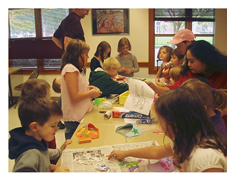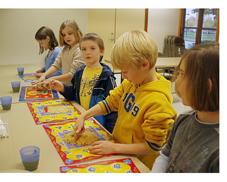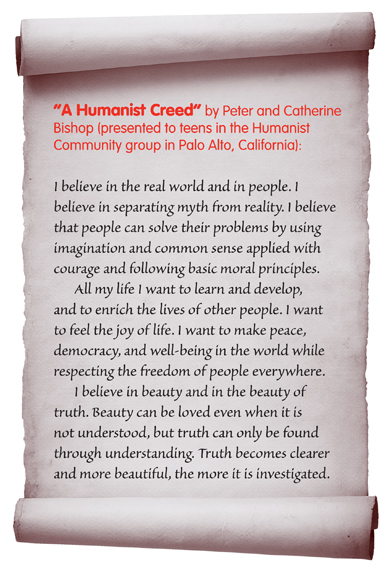Rational Sunday School
It’s Sunday morning at a community center in a suburb of Portland, Oregon. A group of children, age four to twelve, form a half circle, their mouths ajar and eyes wide, staring at the man in front of them. He performs a magic trick as part of the day’s Rational Sunday School activity, dubbed “magic and illusions.” Mike Mitchell, founder of the program, parent of two young ones, and magician for a day, has just captured a ghost inside a napkin. He invites the children to touch the napkin and feel for themselves. Unfortunately the ghost “collapses,” the children break into uncontrollable laughter, and Mike wipes his forehead. Today’s meeting is much more work than usual. Mike has spent hours researching, watching magic videos, and practicing his tricks at home. After each trick Mike explains to the kids how it worked and why. The “oohs” and “ahhs” confirm the class is a success, and the children thank their magician cheerfully before running off for free playtime.
 Rational Sunday School, as the Sunday morning children’s activity for children of atheists and humanists is called in Portland, is not a particularly new movement among humanists in the United States. As a matter of fact, The Ethical Humanist Society of Long Island has had a children’s ethics program for kids between the ages of five and thirteen in place since the 1960s. The group meets each week as part of what the Ethical Society calls their Sunday platform (the Portland group’s twice-a-month meetings generally split into two groups, “The Little Ones” and “Tween Talk”). Sharon Stanley, the Long Island children’s ethics program director says, “Our themes encompass Ethical Culture history, comparative religion, current events, social action projects, and the Six Pillars of Character [as defined by the Josephson Institute Center for Youth Ethics].”
Rational Sunday School, as the Sunday morning children’s activity for children of atheists and humanists is called in Portland, is not a particularly new movement among humanists in the United States. As a matter of fact, The Ethical Humanist Society of Long Island has had a children’s ethics program for kids between the ages of five and thirteen in place since the 1960s. The group meets each week as part of what the Ethical Society calls their Sunday platform (the Portland group’s twice-a-month meetings generally split into two groups, “The Little Ones” and “Tween Talk”). Sharon Stanley, the Long Island children’s ethics program director says, “Our themes encompass Ethical Culture history, comparative religion, current events, social action projects, and the Six Pillars of Character [as defined by the Josephson Institute Center for Youth Ethics].”
In addition to Sunday morning activities, the society offers field trips to traditional places of worship, including a mosque and a church, making sandwiches at a local soup kitchen, bowling, game nights, and other fun trips. “I think the children who attend an ethical children’s Sunday program discuss ideas and participate in activities they will never have in school and might never participate in otherwise,” says Stanley, and adds, “[The teenagers are] smart, self-assured, honest, and totally involved with the issues and politics of the day.”
Portland and Long Island, New York, aren’t the only places in the country with such groups in place. Albuquerque, New Mexico; Palo Alto, California; Chicago, Illinois; and Harvard University offer similar programs, and their success shows. The Palo Alto Humanist Society has offered a popular Sunday school off and on since the early ‘80s. While the younger group has no overriding curriculum and activities are led by a different person each week, Peter Bishop, one of the founders of the Palo Alto Sunday school, has written a textbook for the older kids’ humanist philosophy class. “Humanism is a living, breathing way of life, not just some dry, irrelevant set of ideas,” says Bishop.
 The Palo Alto Humanist Community was featured in Time magazine in November 2007, and in March 2008, ABC’s Nightline did a segment of “Faith Matters” on the group and their Sunday school.
The Palo Alto Humanist Community was featured in Time magazine in November 2007, and in March 2008, ABC’s Nightline did a segment of “Faith Matters” on the group and their Sunday school.
The Harvard Humanist Parents group was formed in December 2008 through the humanist chaplaincy at Harvard led by Greg Epstein. Monthly gatherings combine small group meetings and occasional field trips. Parenting classes are also offered to assist parents in raising ethical, caring children. The Harvard group was recently profiled in a March AP story that appeared in a variety of media, including the Washington Post, USA Today, and the Salt Lake Tribune.
The Humanist Society of New Mexico has a very new program in place, currently for children age four to nine. Jeff Cornelius, leader of the family co-op, states, “We have decided to focus on five key areas that we see as critical to humanist education. These areas are based in part on the philosophy expressed in [Dale McGowan’s] Parenting Beyond Belief. They are: religious literacy, ethics, personal responsibility, critical thinking, and experimental science.” Parents are responsible for planning the group’s activities, including storytelling, singing, recreation, and a science experiment, which Cornelius says always lights up kids’ faces with surprise and prompts questions.
 McGowan agrees with this approach to teaching children. “I would try to blow their minds–get them to say ‘wow!’ and mean it,” says the author, who adds there’s really no reason to go looking for mythic sources of amazement when the real world is so accommodating. When asked what a rational children’s program ideally should look like, McGowan states:
McGowan agrees with this approach to teaching children. “I would try to blow their minds–get them to say ‘wow!’ and mean it,” says the author, who adds there’s really no reason to go looking for mythic sources of amazement when the real world is so accommodating. When asked what a rational children’s program ideally should look like, McGowan states:
It should, first and foremost, be human and humane–fun and emotionally satisfying. Critical inquiry would be part of it, although I wouldn’t call it that, or anything like it. I’d call it “Asking Great Questions.” It should be wonder-based, not framed like some noble Arthurian quest for truth. There would be no weird black-and-white head shots of famous freethinkers around the room. I would want critical thinking activities to never exceed a one-to-one ratio with activities exploring empathy and ethics. And both should be further complemented with pointless fun.
Atheists, humanists, agnostics, nonbelievers–whatever you’d like to refer to yourself–you’ve learned that you’re not alone. As a matter of fact, studies show the number of nontheists in the United States ranges between 10 and 18 percent of the adult population, with the highest occurrence of nonbelievers in the youngest age brackets. Nonbelievers have always “been around,” but it has become easier in recent years to admit to one’s own lack of religion when asked the infamous “Which church do you go to?” question. What remains a problem is to find the kind of community religious people in this country have available to them, simply by belonging to a church, mosque, or synagogue. Nonbelievers, like their religious peers, generally like to surround themselves with like-minded people, to be loved and understood, to discuss issues of everyday life and deeper topics, and of course to provide the same sense of community to their children.
For those who aren’t lucky enough to live anywhere near the groups mentioned here, resources are plentiful to either connect with a similar group in your area or start your own. The following are useful steps to establishing a successful Sunday school community in your neck of the woods.
- 1. Use a search engine to locate possible humanist chapters in your area. A good place to start is the American Humanist Association (AHA). Or try your luck on meetup.com or yahoogroups.com for atheists, nontheists, or humanist groups. Or start your own–it only takes a few minutes.
- 2. Advertise in local newspapers, on Craigslist and other online forums; post flyers in supermarkets, community centers, libraries, and other public places. Creating a group contact e-mail address is a good idea.
- 3. Once you’ve recruited at least three or four families, hold your first brainstorming meeting (or, if you already have a whole set of great ideas, present them to your group). You can meet at a coffee shop, a restaurant, the library, or, if you’re comfortable enough, at your house. Don’t end the meeting without answering a few questions: When will the first Sunday school be held and where? Also, which activities will be introduced (this can be as simple as story time and a few songs), and on what topics?
- 4. At the end of the first Sunday school meeting, plan the next activity and ask for volunteers to lead it. Ask participants for word-of-mouth promotion of your group.
- 5. After several weeks or even a couple of months meet with parents to brainstorm new ideas and ask for feedback. Don’t be afraid to ask for volunteers to step up and lead activities. Also, create core principles for the group or adopt them from an established chapter. Decide whether you’d like to follow a set curriculum or take the “wing it” approach.
- 6. Try to meet several times a month (later more often) to get the children acquainted and comfortable with each other. Field trips, play dates, and museum visits are always great ideas for socializing. Arranging a parents’ night out is also a great idea.
- 7. Locate a variety of sites for activities. Some libraries and community centers will let you rent rooms for free (although some will require you to be a registered club) or for a small fee. Agree on a “membership fee” to pay for room rentals, material fees, and so forth.
- 8. Once your group grows, decide whether you’d like to stay a private group or join an organization like the AHA, which will help when you try to add more structure to your program.
Whatever your goal or vision, it doesn’t take too much of an effort to find like-minded people for your cause. And it’s important to note that rational Sunday schools are not created to bash religion. The image of the bitter atheist is not one that should be conveyed to the next generation. The real task is to raise children with a true understanding of who they are and why others may be different, and that it’s okay that way. Or as Dale McGowan puts it, “I want to know about the world, because it is so cool, and because I’m so incredibly lucky to have ended up a conscious thing in the midst of it.”

